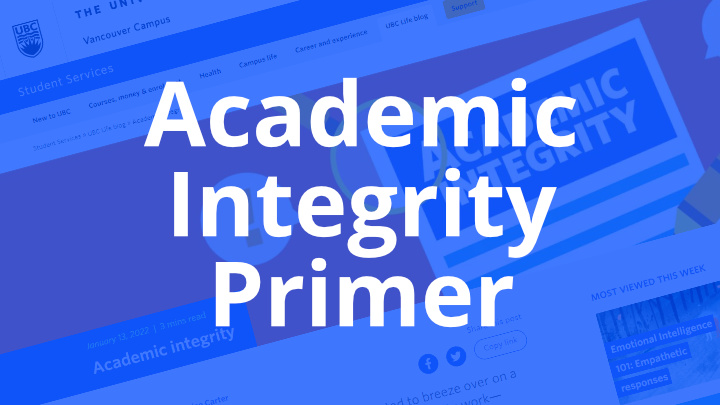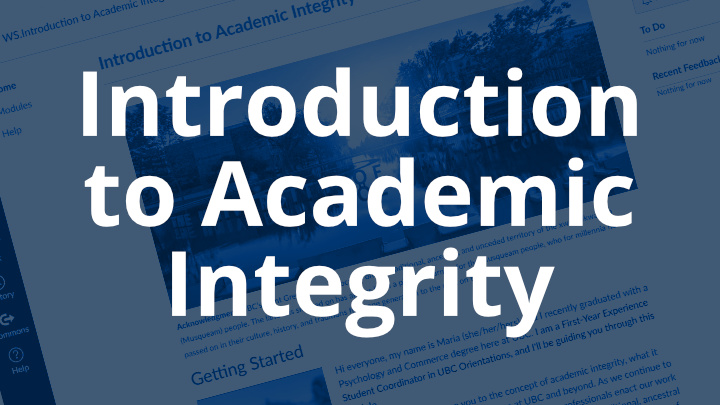Understanding Academic Integrity
Let’s clear up some confusion.
Academic integrity is a commitment to upholding the UBC values of respect, integrity, and accountability in all academic endeavours. However, it can be confusing to know when it is OK to collaborate with a friend, or whether you can resubmit your own work.
There are many misconceptions regarding what academic integrity means. Learning what they are and how to react to them is the first step towards embracing its values.
Check out the information about academic misconduct for more details on what qualifies as a breach of academic integrity at UBC.
Things to reflect on
What is learning with integrity?
What is academic misconduct?
What can you do if you find yourself in a position where you are tempted to engage in academic misconduct?
Common Misconceptions
All resources can be used during “open-book” exams
If an exam is “open-book” you need to follow the exam instructions. Some of them permit course notes only, while others allow using any resources other than another person. If you are unsure about what you can use during an exam, ask your instructor. Using unauthorized resources during an “open-book” exam is considered academic misconduct.
Using subscription-based services to view answers or submitting papers bought online is allowed
While in a crunch, it may be very tempting to post questions or assignments on commercial academic help websites. However, it is a violation of copyright laws (a form of non-academic misconduct) to repost instructors’ intellectual property without their consent. It may even be tempting to purchase papers online.
This can be confusing, especially during “open-book” exams where you are allowed to use search engines. Furthermore, some of these websites can be very exploitative and predatory, releasing information to schools if you do not pay further fees. Save yourself money and avoid subscribing to these websites or purchasing papers.
It is acceptable to get some help if it does not happen often
A student life is a busy life. Between balancing extracurricular activities, classes, friends, and family, it can be tempting to commit academic misconduct from time to time. The consequences of engaging in academic misconduct can have serious and longstanding impacts. For example, a typical minimum penalty for academic misconduct is receiving zero on the assignment.
Of course, life happens. If you are unable to meet a deadline or are struggling with the course, reach out to your instructor. If you are struggling with time management, stress, or other issues in your life, there are many resources on campus that can help you. By reaching out to your instructor early for extensions, academic concessions, or other supports for accommodations and academic help, you can avoid engaging in academic misconduct and the possible consequences arising from an investigation.
The same work can be submitted multiple times
Unless your instructor has given you permission, this is considered self-plagiarism (resubmitting your own work from other courses). If you are using your previous work, make sure that you are citing it and that you have checked with your instructor that it is acceptable to use in your present course.
Everyone is doing it
Sometimes, when working with friends or in a group chat, it can feel like everybody is sharing answers or cheating, and you may be peer-pressured into sharing your answers. You may even find yourself implicated unintentionally. By staying involved, even if you are not trying to commit academic misconduct, you could be implicated in an academic misconduct case.
If you see people sharing answers, even to assignments that are worth just a small percentage of your course grade, try reminding your peers of the need for academic integrity and the assignment guidelines. For example, if people are sharing answers on an individual assignment, let them know that you are uncomfortable with sharing answers and that it should be completed individually. By doing so, you are helping to promote a culture of academic integrity. All members of the UBC community need to understand and commit to the values of respect, integrity, and accountability in all academic work, and support others to do the same. If you do not feel comfortable doing this you can always reach out to your instructor for guidance.

Did you know that submitting the same work more than once can be considered academic misconduct?
Collaborative learning and group work do not count as academic misconduct
Studying with peers is a good way to learn, but it is important to do so with integrity. Discussing broad themes with others may be acceptable, but sharing answers is not. You may be tempted to use or closely follow a peer’s assignment, data, or chart. You may feel like sharing your own work to help a friend out. This is collusion, which is helping another person engage in academic misconduct. Learn more about academic integrity through collaborative learning.
Common knowledge does not have to be cited
Sometimes sources like information from social media, content from non-academic origins, or data from peers can be mistaken for “common knowledge”. However, this can sometimes amount to academic misconduct. Even if it is from a non-academic origin, take steps to cite your sources properly. The purpose of citations is to make it possible for others to fact-check your work, and to judge whether your claim is based on solid evidence.
Concepts and ideas that are common knowledge do not need to be cited. What is, and is not, common knowledge varies between context and disciplines. When in doubt, cite.
It is not mandatory to cite sources during oral presentations
If you are giving an oral presentation, you should still cite your sources. Anytime you use information that is not yours, you should be citing it or referencing where the information came from (whether in slides or in speech). It will also make you a more credible and confident speaker. Helpful information about citations in oral presentations is available through the Precedents Archive for Scholarly Speaking.
If an instructor does not warn against academic misconduct, rules do not have to be followed
If you are confused about whether something constitutes academic misconduct, ask your teaching team! If your instructor did not ask for any sources, you should still cite them for good practice. If you are unsure whether you can work on an assignment individually or with others, do not hesitate to clarify. If any of the situations above are confusing, make sure to ask for clarification.
If you are ever unsure of what is acceptable, ask your instructor. If you need support with time management and mental well being, please reach out. UBC has resources to support you.
Understand Academic Integrity from the Chapman Learning Commons
References
The content on this page was inspired by the following websites
- Toronto Metropolitan University: Academic Integrity Office, Common Academic Integrity Misconceptions
- Queen’s University: Academic Integrity, Common Misconceptions



